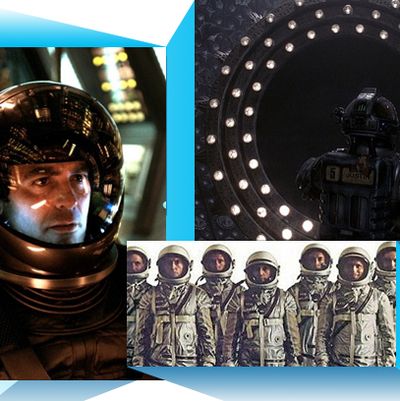
This weekend, as you search for a movie to watch, you can either go out to the theater or stay home and pick one of approximately 14 billion options available to stream over a variety of services, be it Netflix, Hulu, Amazon, On Demand, or other sites. Every Friday, Vulture tries to make life easier by narrowing it down to a handful of heartily recommended options. This week, inspired by Alfonso Cuar├│nÔÇÖs Gravity, weÔÇÖve lined up a selection of space travel cinema, including a historical thrill ride, a bizarre black hole expedition, and even a little universal exploration with Stephen Hawking.
The Right Stuff
Gravity provides us with a worse-case scenario space mission of space debris snowballing into satellites to create an even bigger mess of space debris (scientifically referred to as ÔÇ£Kessler syndromeÔÇØ). But even best-case scenarios are death-defying when space travel is involved, as shown in Philip KaufmanÔÇÖs exhilarating adaptation of Tom WolfeÔÇÖs The Right Stuff. At over three hours, Kaufman is given the breathing room to chronicle everything that led up to the first manned space fight and the brunt of the ÔÇ£Space Race.ÔÇØ Perhaps more important than the incredible stunt photography involved with re-creating those events is how Kaufman captures the immense pressure test pilots were under to deliver results. Sam Shepard, Ed Harris, Scott Glenn, Dennis Quaid, and one of the best ensemble casts ever assembled suit up to portray the founding fathers of NASAÔÇÖs space program, with slightly more sophistication than Tom Cruise and his band of hotshot, Top Gun douchebags. Just a smidge. Bonus fun fact: Harris appears in The Right Stuff as John Glenn. He also appears in Gravity as the offscreen voice of Mission Control. (iTunes, Amazon)
Event Horizon
Whenever a new Resident Evil movie hits screens, remind yourself that director Paul W.S. Anderson once pushed himself hard enough to devise a cross-dimensional rescue movie that sends Sam Neill and Laurence Fishburne to hell. Yes, actual hell. The setup is the right kind of geeky: The crew of the Lewis and Clark plan to investigate the dead-in-the-water ship Event Horizon by activating a ÔÇ£gravity drive,ÔÇØ sending them through a black hole and across the galaxy. A wrong (or the only?) turn sends them to an alternate universe described as being ÔÇ£pure evil.ÔÇØ Neill and Fishburne bring the gravitas while Anderson complements with visual panache. Christopher Nolan may put this movie to shame with his upcoming Interstellar, but until then, Event Horizon is hard sci-fi, alien-less adventure done right. (Netflix)
Into the Universe With Stephen Hawking
For when youÔÇÖve rewatched Carl SaganÔÇÖs Cosmos so many times on Hulu that you can sing along to the miniseriesÔÇÖs┬áAuto-Tuned mash-up, thereÔÇÖs Stephen HawkingÔÇÖs 2010 three-part Discovery Channel special. The famed physicist wrote and briefly appears in the show, bridging a gap between imaginative science fiction and centuries of cosmological discovery. More of a miracle than his vast intellect is HawkingÔÇÖs ability to communicate his findings in a digestible, provocative fashion. One episode revolves entirely around the possibility of life on other planets, addressing every ÔÇ£What if?ÔÇØ with sound reasoning and beautifully animated explanations. I would reckon that few of us were ÔÇ£dazzledÔÇØ by eleventh-grade physics, even those interested in theoretical science. ThatÔÇÖs HawkingÔÇÖs brilliance ÔÇö Into the Universe is a spectacle of the mind and senses. (Amazon Prime, Netflix)
Solaris
If youÔÇÖve seen the Steven Soderbergh remake starring George Clooney, then itÔÇÖs finally time to take the leap on Andrei TarkovskyÔÇÖs meditative original. In the late sixties, the Russian auteur was desperate for a hit, so he decided to tackle Polish author Stanis┼éaw LemÔÇÖs existential, science fiction novel Solaris (oh, how times have changed). The movie functions as an intimate companion to 2001: A Space Odyssey, where the long voyage and discovery of extraterrestrial life force the lead character, Kelvin, to look inward and confront the ghosts of his past. Through the manifesting powers of the sentient planet below him, Kelvin is visited by his late wife, who committed suicide years before. As the space station psychologist digests his ÔÇ£hallucinations,ÔÇØ Tarkovsky raises questions of reality and emotion, draped in stunning, retro-futuristic photography. SoderberghÔÇÖs version is terrific, but this movie is otherworldly. (Hulu)

